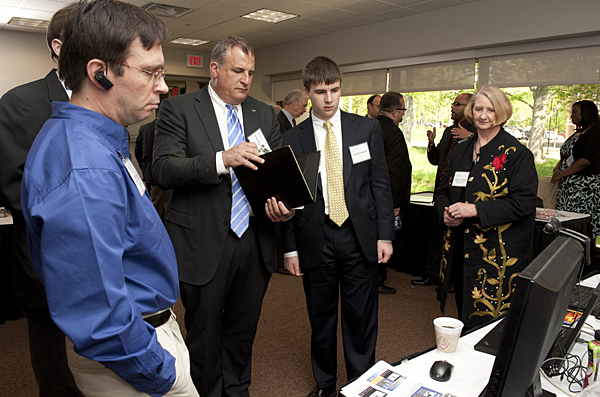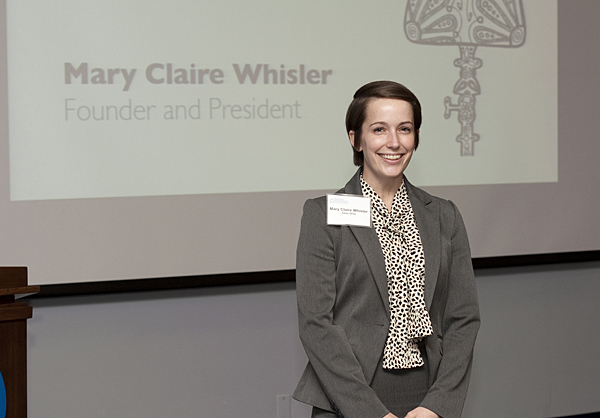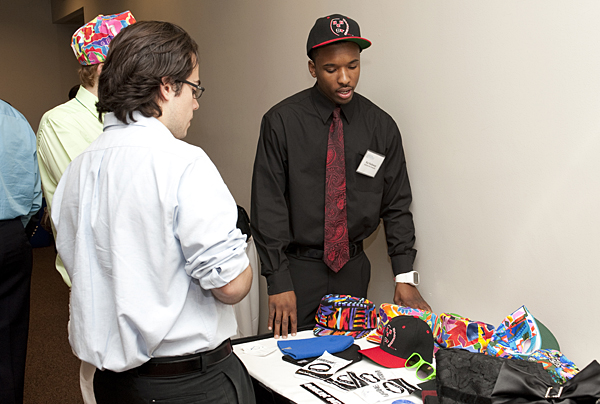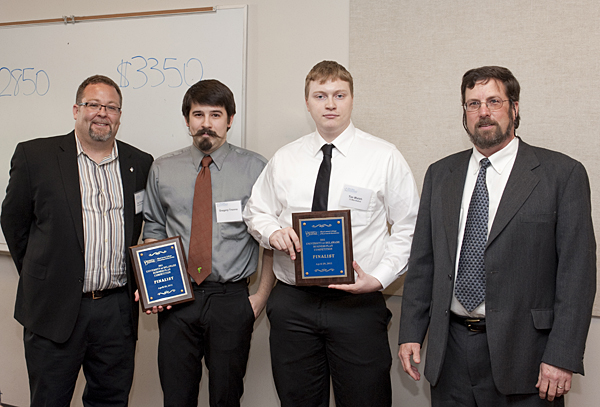Planning for business success
Finalists pitch ideas in University's business plan competition
9:21 a.m., May 5, 2011--Offering an innovative approach to retail that allows college females a venue to swap their gently used apparel with one another, University of Delaware senior Mary Claire Whisler received high marks for her Swap Shop venture as a finalist at this year’s Business Plan Competition, held April 29 at Clayton Hall on UD's Laird Campus.
Swap Shop, which Whisler calls a “cooperative closet,” will offer access to a shared wardrobe where women will be able to indulge their clothing passions at a much lower cost than traditional apparel retail.
People Stories
'Resilience Engineering'
Reviresco June run
Whisler said the competition helped her to hone her creative problem solving skills, and spoke highly of the support and motivation she received from her mentors.
“It was encouraging to have others validate my idea and provide feedback to make the business plan better,” said Whisler, a fashion merchandising major with minors in entrepreneurial studies and fashion history and culture. “Whether I end up working for someone else or being my own boss, the competition taught me to take ownership of my ideas, be confident and vocal with my contributions and remain open to the advice of others.”
Hairline Hat Company, led by sophomores Mark Bailey and Kai Hadaway, was a finalist with a fashionable headwear design brand that “pushes to design hats that fuse expert fashion research, fine artistry and catch metaphors.”
“Our strategy is identifying our brand with the lifestyle of our target market,” said Bailey, a sport management major. “We don’t want our brand to be a certain group of people; we want people to be a part of our brand.”
Rather than focus on mainstream headwear, the duo says they hope to revolutionize the hat industry by creating fun, unique headwear.
“We would rather be seen as an exclusive brand versus a mainstream brand, and we sell our products in locally-owned stores in order to develop a relationship and reputation in the area,” said Bailey.
Of the competition, Bailey said it was useful to have a different audience.
“We are used to dealing and selling to students and retail store owners, so we had to get into the mode of pitching our idea to investors who had money that they were willing to distribute with the expectation of nothing in return,” said Bailey. “That is straight profit and there is nothing more exciting to a business owner than that.”
Voltaic Coatings, run by Keith Modzelewski, an MBA student; Rick Walsh, also an MBA student; Pat Lowry, a master's degree student; Chelsea Haughn, a doctoral student; and Nandita Bhagwat, also a doctoral student, took third place in the competition.
A specialty conductive polymer distributer, the company utilizes toll manufacturing to create a highly customizable polymer called ProDot Plus.
Voltaic Coatings hopes to commercialize ProDot Plus for application as a conductive layer in organic LEDs (OLEDs) and solar panel manufacturing, as well as a replacement for Indium Tin Oxide (ITO), a major cost driver in many electronic devices.
For the less scientifically inclined, that means they’re aiming for the production of flexible or bendable computer displays and TVs, as well as thinner touch screens at a fraction of the cost of current materials.
Through detailed market research the team found a growing demand for touch screens and displays using ITO, and with the increasing costs of ITO and increased demand for new technologies, saw a great potential to launch their company.
The team was appreciative of the learning experiences the competition afforded them, including learning the process of commercializing an advanced scientific material and working as part of a cross-functional team to help advance the understanding of the many facets involved in business development.
“We greatly enjoyed the networking aspects of discussing and communicating our passion for this technology,” said Modzelewski. “Mentors in the SBTDC (Small Business and Technology Development Center) and University professors also helped us learn to communicate an advanced technology to diverse audiences and they prepared us for the next step in our business career – launching Voltaic Coatings.”
Also finalists were Tim Walsh, a computer science major, and Greg Truono, co-founders of 12 Mile Radius, a mobile game and applications development company whose mission is to legitimize mobile devices as gaming platforms with the kinds of complex, involved game experiences that today’s users have come to expect from their PCs and consoles.
Noting that the expected growth of the app market is set to multiply dramatically by 2014, the team explained that one of their main challenges is to make sure their apps are noticed.
“We don’t want to contribute to the thousands of ‘bad’ apps that make up the ‘noise’ of the market so we decided to focus on how we would make an impact,” said Walsh. “In order to create engaging and worthwhile apps, our approach is built on human cognition. We develop our software with how people think in mind.”
At present, the team is making efforts to finish development of their first game with the goal of releasing the iOS version by fall. To learn more, follow the 12 Mile Radius development blog, visit the 12 Mile Radius Facebook page or follow them on Twitter @12MileRadius.
Dan Freeman, director of the Entrepreneurial Studies (E-Studies) Program and professor of business administration, commended the students for their participation in the competition.
“Our students did a great job of pitching their business plans, and I received great feedback from the competition judges and attendees who made many positive comments about the students and their ideas,” said Freeman.
In return for their efforts, the teams were awarded shares of a $10,000 prize pool, money made available by the generosity of UD alumni, partner organizations and friends of the E-Studies Program.
The competition was held as part of the E-Forum on Entrepreneurship, sponsored by the E-Studies program in the Alfred Lerner College of Business and Economics, which aims to strengthen connections between campus-based stakeholders and the broader entrepreneurial community.
Prior to the competition, the E-Studies program partnered with First State Innovation (FSI) for the presentation of its Spring Entrepreneur Showcase, which featured a keynote address by U.S. Sen. Chris Coons (D-Del.), who has made it a priority to assist the growth of small businesses, particularly those in the manufacturing sector.
Heads of companies were also on hand to share with students their stories and processes for seeking venture funding, including Isaac Gadsden, CEO of HeMemics Biotechnologies; David Argentar, president and founder of Sun Edge; and Michael Phelan, president and CEO of SevOne.
Freeman called the partnership with FSI “a great success.”
“The FSI showcase provided our students with the opportunity to learn from companies that are actively seeking early stage investment,” said Freeman. “The partnership also provided the competition finalists with an opportunity to present their ideas to seasoned investors who provided useful feedback about startup funding options and strategies.”
Article by Kathryn Marrone
Photos by Kathy F. Atkinson















